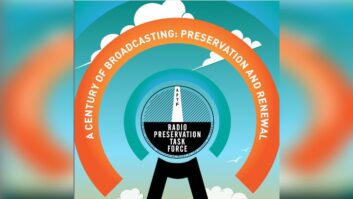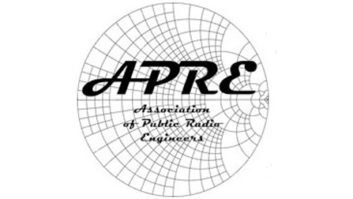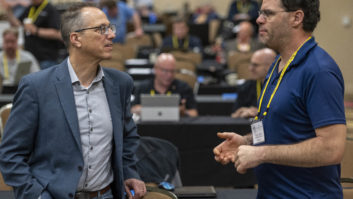
The conference is one result of the National Recording Preservation Plan published in 2012 by the Library of Congress.
On Feb. 26 and 27, the Radio Preservation Task Force (RPTF) of the National Recording Preservation Board (NRPB) will hold its first national conference at the Library of Congress on Friday and the University of Maryland on Saturday.
Scholars, curators, sound preservationists and archivists from more than 100 universities, museums and libraries will converge on Capitol Hill to discuss steps toward preserving radio’s aural history, including the many historical events captured by nontheatrical broadcasts such as news, town hall meetings, public forums and sporting events.
Participants have been confirmed from NPR, the Smithsonian, Pacifica, the American Archives of Public Broadcasting, Radio Survivor and multiple academic research groups. Presenters will discuss the common goal of how to best assess, protect, preserve and implement current and future findings, with reference to conventional history work, museum curation, classroom pedagogy and material preservation actions.
Sound preservation pioneer Sam Brylawski serves as the practitioner keynote of the conference. Brylawski mandated the task force as previous chair of the NRPB, to meet some of the recommendations of the National Recording Preservation Plan. The NRPB is now chaired by RPTF Convener and Director Christopher Sterling, who will introduce Brylawski at the conference. Paddy Scannell, eminent historian of the BBC and founder of the internationally influential journal Media, Culture, and Society, serves as academic keynote for the conference. About 150 persons are expected to attend two very full days. The program can be found at www.radiopreservation.org.
The RPTF is a growing consortium of 175 research directors, associates, caucuses and Library of Congress employees. The conference represents a milestone for film and media studies, uniting cutting edge innovators in digital humanities with experienced sound archivists and prominent cultural historians. The eventual preservation and processing of radio materials will be of great service to historians and listeners. Radio provides diverse insight into local cultural history, and indeed sometimes represents the sole remaining primary sources of historical experiences, when print sources are scarce or no longer available.

During 2015 the RPTF made strong progress in organizing for a long-term national preservation project. The first action was to sign up more than 100 researchers to scour libraries, universities and radio archives to see what radio sound materials were already available. By April 2015 our the Task Forces research associates identified roughly 350,000 recordings, of which only a few thousand are currently digitized, with many more remaining on obsolete technologies such as reel-to-reels and DATs. Initial findings were enough to encourage Library of Congress staff to green-light a second phase of the project, which began over the summer of 2015 and has consisted of building a decentralized network between academic, federal and archival groups toward the common goal of radio preservation.
Over that time the task force has recruited experts in content areas ranging from African American civil rights to Spanish language, to baseball radio history, to identify the most crucial recordings for preservation. Due to these considerable initial findings, and the expectation that once archival aggregation exhaustively resumes that the task force will easily turn up over 1 million radio recordings, the RPTF plans to first aid with the digital preservation of materials deemed most in need of preservation and circulation, as decided by research specialists in various areas. Research specialists will also help unite the materials of “split collections,” or recordings from a single location or featuring a single broadcaster, which have been spread among multiple archives.
The RPTF has also commenced an “Endangered Collections” initiative, to save radio collections that are in danger of disappearing. Working with a distinguished board consisting of members of the Library of Congress, Smithsonian, NPR and major universities, the task force is seeking shelf space from archives looking to buttress their collection and reputation among “sound studies” researchers. The RPTF hopes to locate one willing archive per state, so that when emergency situations with materials arise that shelf space is on hand for a task force-approved deposit.
Over 2016 two more of the task force’s major initiatives will begin.
First, in collaboration with the Association for Recorded Sound Collections (ARSC) and Indiana University, the RPTF is building a “big data” search engine that will help researchers and listeners locate available radio recordings, while also providing many broadcast examples deemed distributable under “fair use,” plus suggested syllabi for all educational levels, developed by our caucus content specialists.
Second, the RPTF will be applying for preservation and curation grants with our partners at multiple university archives, as well as with Pacifica Radio Archives, considered by many to be the great collection of postwar local and community radio history in the U.S. In collaboration with the National Recording Preservation Foundation, the RPTF has already distributed its first grant: to the Lily Library at Indiana University to digitally process, preserve, and distribute the complete Orson Welles radio broadcasts. This will be the first time these recordings — which are all now in the public domain — have been made available in completion. We expect to build a special website with these materials sometime in 2017.
Josh Shepperd is assistant professor of media & communication at Catholic University, national research director of the Radio Preservation Task Force of the NRPB, and planning director for the conference. Christopher Sterling is an associate dean at George Washington University, a broadcast historian and chair of the National Recording Preservation Board (NPRPB) of the Library of Congress
Related:
No Local Radio History Is Too Small (2014)
Saving Sound: The Library of Congress Highlights Radio (2013)










